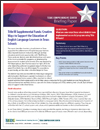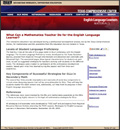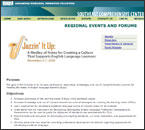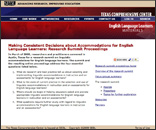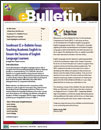SEDL's Free A-Z List of Free Resources for English Language Learners
English Language Learners
All Products in this Category
Products are listed by date published.
Mathematics instruction in the United States has historically focused on procedures, facts, and algorithms. Because of that focus, mathematics instruction, in essence, becomes lessons in arithmetic and efficiency. While there are promising changes occurring in mathematics instruction, we still need to help both teachers and students develop a more conceptual understanding of mathematics. This issue of SEDL Insights helps educators shift from helping students memorize rules to facilitating a deeper understanding of mathematics concepts.
This article provides useful research-based information for educators and others seeking to support English learners (ELs) at the secondary level in social studies, science, and mathematics. The article may also prove helpful for those who would like to learn about factors that influence the educational achievement of this significant and growing number of students. Furthermore, the authors provide some general strategies used in English as a Second Language (ESL) programs to demonstrate the distinction between ESL and the content needs of ELs.
This home-based migrant preschool program provides 100 lessons aligned to the Revised Texas Prekindergarten Guidelines. The lessons, available in both English and Spanish, are organized around early learning themes or units. A manual to guide home educators and migrant program coordinators is included.
The Trouble With Math Is English was presented by Como Molina at the Conference for the Advancement of Mathematics Teaching, San Antonio, TX, in July 2010.
The presentation slides for The trouble with Math is English are available online in PDF format. Click here for a text transcript of the slides.
This report describes how two school districts in Texas supported the achievement of English language learners (ELLs) beyond classroom instruction, through ancillary education enrichment opportunities with Title III funds. These particular districts were identified as those with some of the most successful ELL programs, as determined by improvement in student achievement.
Based on a 2006 professional development session for math and ESL specialists, this online interactive document includes teaching strategies for ELLs at various levels, critical components to include when designing math lessons for ELLs, and a list of relevant resources.
Creating a culture that supports English Language Learners (ELLs) through the use of research-based instructional strategies and targeted approaches was the focus of a regional institute held by the Southeast Comprehensive Center (SECC). The institute took place November 5–7, 2008, in New Orleans, Louisiana. The goal of this institute was to increase participants’ awareness, knowledge, and use of research-based practices for meeting the needs of ELLs.
In March 2009, researchers and practitioners convened in Austin, Texas, for a research summit on linguistic accommodations in instruction and on assessments for English language learners (ELLs). This online publication describes the proceedings and outcomes of the summit.
This issue of eBulletin, published quarterly, focuses on strategies for helping English language learners (ELLs) develop academic English.





